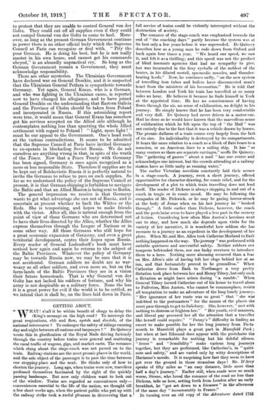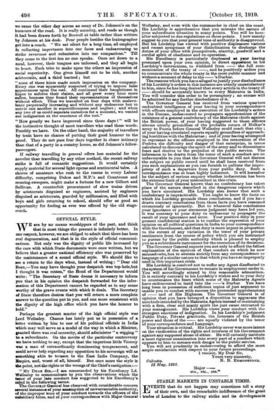GETTING ABOUT.
" WHAT ! it be within benefit of clergy to delay the /King's message on the high road ? To intercept the great respirations, ebb and flow, systole and diastole, of the national intercourse ? To endanger the safety of tidings running day and night between all nations and languages ? " De Quincey wrote this in glorification of the Royal Mails driving furiously through the country before trains were general and scattering the rural traffic of wagons, gigs, and market carts. The romance which clung about the stage-coach was not passed on to the train. Railway stations are the most prosaic places in the world, and the sole object of the passenger is to pass the time between one stopping-place and the next. He thinks only of how to shorten the journey. Long ago, when trains were new, travellers professed themselves fascinated by the sight of the quickly passing landscape. But now only children want to look out of the window. Trains aro regarded as conveniences only— conveniences essential to the life of the nation, we thought till a few short weeks ago, when the patient public who put up with the railway strike took a rueful pleasure in discovering that a
full service of trains could be violently interrupted without the destruction of society.
The romance of the stage-coach was emphasized towards the end of " the coaching days " partly because the system was at its best only a few years before it was superseded. Da Quincey describes how as a young man he rode down from Oxford and back again four times a year. " We heard our speed, we saw it, and felt it as a thrilling; and this speed was not the product of blind insensate agencies that had no sympathy to give, but was incarnated in the fiery eyeballs of the noblest of the brutes, in his dilated nostril, spasmodic muscles, and thunderbeating hoofs." Now, he continues sadly, " on the new system of travelling iron tubes and boilers have disconnected man's heart from the ministers of his locomotion." He is told that between London and York his train has travelled at so many miles an hour. He believes it because he finds himself in York at the appointed time. Ho has no consciousness of having flown through the air, no sense of exhilaration, no delight in his journey. He simply knows that he has been very comfortable and very dull. De Quincey had never driven in a motor-car. Had he done so he would have known that the marvellous sense of exhilaration which he felt upon the top of " the Mail " was nut entirely due to the fact that it was a vehicle drawn by horses. The prosaic dullness of a train comes very largely from the fact of its size. Its individuality is destroyed by its compartments. It bears the same relation to a coach as a block of flats bears to a mansion, or an American liner to a sailing ship. It has " as many centres as there are separate carriages," scoffs De Quincey. The " gathering of gazers " about a mail " has ono centre and acknowledges one interest, but the crowds attending at a railway station have as little unity as running water."
The earlier Victorian novelists constantly laid their scenes in a stage-coach. A journey, even a, short journey, offered opportunities for character-drawing, for comic relief, and for the development of a plot to which train travelling does not lend itself. The reader of Dickens is always stepping in and out of a coach in tragic or in comic mood. He may be following the escapades of Mr. Pickwick, or he may be gazing horror-struck at the body of Jonas when on his last journey he " booked through." A little earlier than Dickens, however, the coach and the postchaise seem to have played a less part in the scenery of fiction. Considering how often Miss Austen's heroines went out to stay, and how much she depends upon visits for the variety of her narrative, it is wonderful how seldom she has recourse to a journey as an expedient in the development of het plots. When Mr. and Mrs. Allen took Catherine Morland to Bath nothing happened on the way. The journey "was performed with suitable quietness and uneventful safety. Neither robbers not tempests befriended them, nor one lucky overturn to introduce them to a hero. Nothing more alarming occurred than a feat on Mrs. Allen's side of having left her clogs behind her at an inn, and that fortunately proved to be groundless." When Catherine drove from Bath to Northanger a very pretty flirtation took place between her and Henry Tilney, but only such a flirtation as might have arisen during " a ramble." When General Tilney turned Catherine out of his house to travel alone to Fullerton, Miss Austen, who cannot be commonplace, resists all temptation to make an adventure of the long lonely journey. " Her ignorance of her route was so great " that " she was indebted to the postmasters " for the names of the places she must pass through to get to Salisbury. She, however, met with nothing to distress or frighten her." " Her youth, civil manners, and liberal pay procured her all the attention that a traveller like herself could require." " Fanny's " difficulty in finding an escort to make possible for her the long journey from Ports. mouth to Mansfield plays a great, part in Mansfield Park ; but when at last Edmund does appear with the postchaise the journey is remarkable for nothing but his doleful silence. " Sense " and "Sensibility" make various long journeys together, but they are performed, like Catherine's, in " quietness and safety," and are varied only by witty descriptions of Marianne's moods. It is surprising how fast they seem to have got over the ground in those steamless days ! Mr. D'Arcy speaks of fifty miles as " an easy distance, little more than half a day's journey." Earlier still, when roads were so much worse, Sterne, who loved the romance of the road no less than Dickens, tells us how, setting forth from London after an early breakfast, he "got set down to a fricassee" in the afternoon of the same day " incontestably in France." In turning over an old copy of the Adventurer dated 1753 we came the other day across an essay of Dr. Johnson's on the humours of the road. It is really amusing, and reads as though it had been drawn forth by Boswell at table rather than written
by Johnson at his desk. Four people besides the lexicographer get into a coach. " We sat silent for a long time, all employed in collecting importance into our faces and endeavouring to strike reverence and submission into our companions." Till they oome to the first inn no one speaks. Once set down to a meal, however, their tongues are unloosed, and they all begin to boast. Each tries to make upon the others an impression of social superiority. One gives himself out to be rich, another aristocratic, and a third learned ; but none of these hints made much impression on the company. Every one was apparently suspected of trying to impose false appearances upon the rest. All continued their haughtiness in hopes to enforce their claims, and all grew every hour more sullen, because they found their representations of themselves without effect. Thus we travelled on four days with malevolence perpetually increasing and without any endeavour but to outvie one another in superciliousness and neglect ; and when any two of us could separate ourselves for a moment, we vented our indignation at the sauciness of the rest."
" How greatly we have improved since those days 1" will be the instinctive thought of most travellers who read these words. Possibly we have. On the other hand, the majority of travellers by train have no chance of putting their good humour to the proof. They do not pass four days together in closer intimacy than that of a party in a country house, as did Johnson's fellow passengers.
If railway travelling in general offers lass material for the novelist than travelling by any other method, the recent railway strike is full of romantic suggestions. It would certainly supply material for several light operas and sentimental tales. • A chorus of amateurs who rush to the rescue in every Labour difficulty, comprising Dukes and M.P.'s and Countesses and crossing-sweepers, might make a fortune for a new Gilbert and Sullivan. A counterfeit presentment of slow trains driven by aristocrats disguised as engineers, assisted by engineers disguised as aristocrats, guarded by millionaires, and filled with boys and girls returning to school, should offer as good an opportunity for fooling as ever was offered by the old stagecoach.







































 Previous page
Previous page